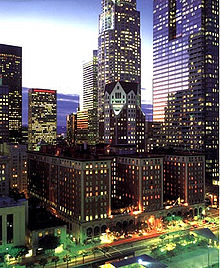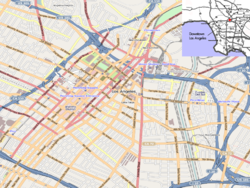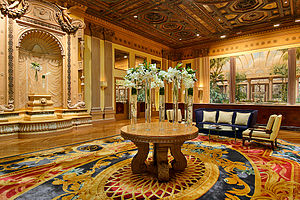- Millennium Biltmore Hotel
-
Biltmore Hotel 
Location within the Downtown Los Angeles Area Location 506 South Grand Avenue, Downtown Los Angeles, California Coordinates 34°2′56.07″N 118°15′11.86″W / 34.0489083°N 118.2532944°W Opening date 1923 Developer Biltmore Hotels with John McEntee Bowman Architect Schultze and Weaver Owner Millennium & Copthorne Hotels Designated: July 2, 1969 Reference #: 60 The Millennium Biltmore Hotel, originally named the Los Angeles Biltmore Hotel of the Biltmore Hotels group, is a luxury hotel located on Pershing Square in Downtown Los Angeles, California. Upon its grand opening in 1923, the Los Angeles Biltmore was the largest hotel west of Chicago, Illinois in the United States.[1] In 1969 the Biltmore Hotel was designated a Los Angeles Historic-Cultural Monument by the City of Los Angeles. As of 2009, the Los Angeles Biltmore is operated as part of the Millennium & Copthorne Hotels chain as the Millennium Biltmore Hotel. The hotel has 70,000 square feet (6,500 m2) of meeting and banquet space. From its original 1500 guestrooms it now has 683, due to room reorganization.[2]
Contents
Architecture
The architectural firm Schultze & Weaver designed the Biltmore's exterior in a synthesis of the Spanish-Italian Renaissance Revival, Mediterranean Revival, and Beaux Arts styles, meant as an homage to the Castilian heritage of Los Angeles. The "Biltmore Angel" is heavily incorporated into the design—as a symbol of the city as well as the Biltmore itself. With a thick steel and concrete frame, the structure takes up half a city block and rises over 11 stories.
The interiors of the Biltmore Hotel are decorated with: frescos and murals; carved marble fountains and columns; massive wood-beamed ceilings; travertine and oak paneled walls; lead crystal chandeliers; caste bronze stairwells and doorways; fine artisan marquetry and mill work; and heavily embroidered imported tapestries and draperies. Most notable are the frescoed mural ceilings in the main Galleria and the Crystal Ballroom, which were hand painted in 1922 by Italian artist Giovanni Smeraldi, known for his work in the Vatican and the White House. Smeraldi and his team famously painted the ballroom's colorful, seamless fresco over a period of seven months, decorating it with figures of Greek and Roman gods, angels, cupids and other mythological creatures. It was meticulously restored in the 1980s by Smeraldi's apprentice, Anthony Heinsbergen. The imported Austrian crystal chandeliers that adorn it are 12 feet (3.7 m) in diameter.
The Rendezvous Court, once the hotel's lobby but now used primarily for afternoon tea, is decorated with a Moorish Revival styled plaster ceiling painted with 24 Carat Gold accents, two original imported Italian chandeliers from 1923, and a grand Spanish Baroque Revival bronze doorway, whose astrological clock still keeps time today. Two figures appear on the stairwell front—on the left is the Roman goddess of agriculture Ceres, while on the right is the Spanish explorer Vasco Núñez de Balboa. The current lobby at the hotel's Grand Avenue entrance still has its original travertine walls and oak paneling as well as the large artificial skylighted ceiling, reflected in the custom carpet below.
Each ballroom on the Galleria level is themed either after the rooms’ original function or the hotel's overall California-heritage premise. The Emerald Room was once the hotel's main guest dining room; its decor features images of hunt and harvest, with hand-painted animals and fish on the cast-plaster ceiling beams. The Tiffany Room was formerly an open corridor used as a drop-off point for Crystal Ballroom functions. Now enclosed, the elegant space centers around exploration, with relief sculptures and panels depicting Queen Isabella I of Castile, and Christopher Columbus and other Spanish New World explorers. The split-level Gold Room, once a dining room for elite guests, features Prohibition-era hidden liquor compartments and panels along the ceiling for press photographers to take pictures of the event below. It is decorated with a gold cast-plaster ceiling, hand-oiled wood paneling, and nine mirrored windows along three sides.
The South Galleria is painted with floral friezes inspired by the decor of ancient Roman Pompeii, and features a vaulted ceiling, marble balustrades and heavy Roman piers. Gold-painted wrought iron gates, made famous in Alfred Hitchcock's 1950s film Vertigo, open to a staircase leading down to the Biltmore Bowl.
Also of interest is the hotel's health club and indoor pool, which was modeled after the decks of 1920s luxury cruise-ships such as the Queen Mary. Solid brass trim on windows, doors and railings, teakwood deck chairs and hand-laid Italian mosaic tile on the walls and in the pool are original. All designs are of a nautical theme.
Restaurants
In 2009, four restaurants and bars serve the hotel, including Smeraldi's Restaurant (Italian cuisine), Sai Sai Modern Asian Cuisine and Sushi Bar, the Rendezvous Court, and the Gallery Bar.
Events
The Los Angeles Biltmore is known for being an early home to the Academy Award Ceremony for the Oscars. The Academy of Motion Picture Arts and Sciences was founded at a luncheon banquet in the Crystal Ballroom in May 1927, when guests such as Louis B. Mayer met to discuss plans for the new organization and presenting achievement awards to colleagues in their industry. Legend has it that MGM art director Cedric Gibbons, who was in attendance, immediately grabbed a linen Biltmore napkin and sketched the design for the Oscar statue on it. Eight Oscar ceremonies were held in the Biltmore Bowl during the Academy's early years of 1931, 1935–39, and 1941-42. In 1977 Bob Hope hosted the Academy's 50th Anniversary banquet in the same room.
The Biltmore Theater was situated at the corner of 5th and Grand from 1924–1967, now the Biltmore Court & Tower location. Will Rogers emceed the opening of the theater in 1924, which then ran plays starring luminaries such as Katharine Hepburn, Henry Fonda, and Mae West until its closure in 1967.
In 1929, Germany's Graf Zeppelin airship soared over the hotel on its round-the-world voyage, sponsored by newspaper magnate William Randolph Hearst. Crew and passengers were fed by Biltmore culinary staff, who also replenished their on-board supplies.
During World War II, the Biltmore served as a military rest and recreation facility, with the entire second floor set up with cots for military personnel on leave.
On March 7, 1952, the well-known yogi and author Paramahansa Yogananda, while giving a speech in honor of the Indian ambassador Binay Ranjan Sen, dropped dead of a heart attack at the Biltmore Hotel.[3][4] This site within the hotel is now revered by many as the place of the yogi's mahasamadhi, or conscious leave of the body.
The 1960 Democratic National Convention in Los Angeles chose John F. Kennedy as the party's presidential nominee, and his acceptance speech was given at the Los Angeles Biltmore Hotel.[5] He set up his campaign headquarters in the Music Room (now the Lobby), with running mate Lyndon B. Johnson across the hall in the Emerald Room. Their press conferences in the Crystal Ballroom were heavily photographed and documented.
The Beatles paid a visit to the Presidential Suite in August 1964 during their first U.S. tour. Due to the overwhelming number of fans crowding the sidewalks in front of the hotel, the "Fab Four" were forced to access their room by landing atop the hotel in a helicopter.[citation needed]
The Los Angeles Biltmore Hotel served the International Olympic Committee as their headquarters during the 1984 Summer Olympics. In 1988 the Duke & Duchess of York were hosted by Armand Hammer at a Biltmore gala. Recently the Biltmore has hosted the semi-finals for American Idol, the yearly awards for the Cinemal Audio Society, visiting teams for the World Baseball Classic, and multiple Grammy Awards after-parties.
Preceded by
The Ambassador Hotel
HollywoodVenues of Oscars
1941 - 1942Succeeded by
The Ambassador Hotel
Los AngelesFilms and TV shows
- Scenes from many movies and television shows have been filmed at the hotel, including:
Movies
Chinatown, A Star is Born, Splash, Bachelor Party, Beverly Hills Cop, Ghostbusters, True Lies, Independence Day, Blow; Ocean's 11, The Nutty Professor, Bugsy, Blue Streak, In the Line of Fire, Wedding Crashers, The Italian Job, Daredevil, National Treasure, Spider-Man, Alien Nation, and Prom Night. The hotel's exterior can also be seen in Heat.[citation needed] The hotel's lobby was used in Janet Jackson's video for "Son of a Gun (I Betcha Think This Song Is About You)", Britney Spears' video for "Overprotected", and the swimming pool was used in the 1999 film Cruel Intentions.[citation needed]
Television
Charlie's Angels, Columbo, Beverly Hills, 90210, Entourage, ER, NYPD Blue, The West Wing, That '70s Show, Ally McBeal, CSI: NY, Nip/Tuck, 24, Drop Dead Diva, The Real Housewives of Beverly Hills, House, and Heroes .[citation needed]
References
- ^ Jones, Finn-Olaf (Apr. 24, 2006). "It's De Limit, It's Deluxe, It's De-Lovely". Forbes. Retrieved 8-27-2009.
- ^ "About Millennium Biltmore's Guest Rooms". http://www.millenniumhotels.com/millenniumlosangeles/index.html. Retrieved 2009-03-19.
- ^ Kriyananda, Swami (1977). The Path: Autobiography of a Western Yogi. Crystal Clarity Publishers. ISBN 978-0-916124-11-3.
- ^ Time magazine (Aug. 4, 1952). "Guru`s Exit". Retrieved 8-25-2009.
- ^ "Feb. 21, 2007 Calitics.com article 'Bill Richardson officially announces in LA', citing May 2007 Los Angeles Times article". Retrieved 2-22-2010.
External links
- Millennium Biltmore Hotel
- "It's De Limit" Forbes article by Finn-Olaf Jones on Biltmore architects Schultze and Weaver, April 24, 2006
Coordinates: 34°02′56″N 118°15′12″W / 34.048908°N 118.253295°W
Los Angeles Historic-Cultural Monument Lists Downtown Los Angeles • East and Northeast Sides • Harbor Area • Hollywood • San Fernando Valley •
Silver Lake, Angelino Heights and Echo Park • South Los Angeles • Westside • Wilshire and Westlake AreasCategories:- Biltmore Hotels
- Hotels in Los Angeles, California
- Landmarks in Los Angeles, California
- Hotels established in 1923
Wikimedia Foundation. 2010.




